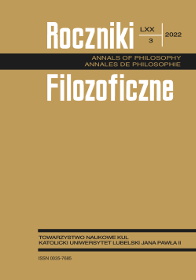On foresight functions of rhetorical invention in acts of counselling
Abstract
Counselling acts consist in indicating useful activities, remedying human deficiencies. Counselling acts are guided by practical cognition. Since counselling activities are oriented towards the future, their crucial element is foresight. It is cognitive reflection foreseeing the implementation of counselling acts. Counselling acts are actualised in rhetorical and communicational context which is associated with persuasive delivery of counselling content. Belonging to the rhetorical canon, invention disposes of factors that influence the justifying formulation of advisory content. Invention factors introduce the anticipatory determinations and concretisations of counselling content. At rhetorical level, inventive methodology plays anticipatory functions which are convergent with tasks of foresight in practical cognition.
References
Abizadeh, Arash. 2002. “The Passions of the Wise: Phronesis, Rhetoric and Aristotles’s Passionate Practical Deliberation.” The Review of Metaphysics 56, no. 2: 267–296.
Aristotle. 1926a. Art of Rhetoric. Translated by John Henry Freese. Loeb Classical Library no. 193. Cambridge, MA: Harvard University Press.
Aristotle. 1926b. Nicomachean Ethics, Translated by Harris Rackham. Loeb Classical Library 73. Cambridge, MA: Harvard University Press.
Gondek, Maria Joanna. 2018. “A Teleological Interpretation of the Applicability of Rhetoric in the Peripatetic Tradition.” Studia Gilsoniana 7, no. 2: 181–199. DOI: https://doi.org/10.26385/SG.070209.
Gondek, Paweł. 2020. “Subjective basis for elucidating communication in the personalistic perspective.” Res Rhetorica 7, no. 1: 71–85. DOI: https://doi.org/10.29107/rr2020.1.5.
Goodnight, G. Thomas. 1982. “The Personal, Technical and Public Spheres of Argument: A Speculative Inquiry into the Art of Public Deliberation.” Journal of the American Forensic Association 18, no. 4: 214–227. DOI: https://doi.org/10.1080/00028533.2012.11821771.
Isidorus Hispalensis Episcopus. 1911. Isidori Hispalensis Episcopi Etymologiarum sive originum libri XX, edited by Wallace Martin Lindsay. Oxford: Oxford University Press.
Jackson, Sally, & Scott Jacobs. 1980. “Structure of Conversational Argument. Pragmatic Basis for the Enthymem.” Quarterly Journal of Speech 66, no. 3 3, p. 151–165.
Kennedy, George A. (ed.). 2003. Progymnasmata. Greek Textbooks of Prose Composition and Rhetoric. Translated with Introductions and Notes by George A. Kennedy. Atlanta: Society of Biblical Literature.
Kennedy, George A. 1999. Classical Rhetoric and its Christian and Secular Tradition from Ancient to Modern Time. 2nd ed. Chapel Hill. London 1999: The University of North Carolina Press.
Loveridge, Jordan. 2017. “Rhetorical Deliberation, Memory and Sensation in the Thought of Thomas Aquinas.” Philosophy and Rhetoric 50, no. 2: 178–200. DOI: https://doi.org/10.5325/philrhet.50.2.0178.
Maciejewski, Jeffrey J. 2014. Thomas Aquinas on Persuasion, Action, Ends and Natural Rhetoric. Lanham, Plumouth: Lexington Books.
Pilsner, Joseph. 2006. The Specification Of Human Action in St. Thomas Aquinas. Oxford: Oxford University Press.
Saiz Noeda, Belén. 2003. “Proof, arguments, places. Argumentation and rhetorical theory in the Institutio oratoria, Book V.” In Quintilian and the law. The Art of Persuasion Law and Politics, edited by Olga Eveline Tellegen Couperus, 95–110. Leuven: Leuven University Press.
Thomas Aquinas. 1952. S. Thomae Aquinatis Summa theologiae. Cura et studio Petri Caramello. Taurini, Romae: Marietta.
Copyright (c) 2022 Roczniki Filozoficzne

This work is licensed under a Creative Commons Attribution-NonCommercial-NoDerivatives 4.0 International License.





